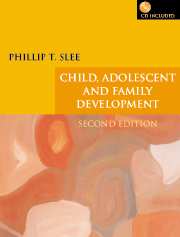Book contents
- Frontmatter
- Contents
- List of Trends and issues
- List of Family life-cycles
- List of Figures and Tables
- Note to the Student
- Note to the Instructor
- How to use the CD-ROM
- Acknowledgements
- Introduction
- Part 1 The Study of Human Development
- Part 2 Conception and Birth
- Part 3 Infancy
- Part 4 Toddlerhood
- 9 Physical Development of Toddlers
- 10 Cognitive Development of Toddlers
- 11 Social and Emotional Development of Toddlers
- Part 5 The Pre-school Years
- Part 6 Middle Childhood
- Part 7 Adolescence
- Part 8 Studying Human Development
- Glossary
- References
- Index
- STUDENT FEEDBACK FORM
11 - Social and Emotional Development of Toddlers
from Part 4 - Toddlerhood
- Frontmatter
- Contents
- List of Trends and issues
- List of Family life-cycles
- List of Figures and Tables
- Note to the Student
- Note to the Instructor
- How to use the CD-ROM
- Acknowledgements
- Introduction
- Part 1 The Study of Human Development
- Part 2 Conception and Birth
- Part 3 Infancy
- Part 4 Toddlerhood
- 9 Physical Development of Toddlers
- 10 Cognitive Development of Toddlers
- 11 Social and Emotional Development of Toddlers
- Part 5 The Pre-school Years
- Part 6 Middle Childhood
- Part 7 Adolescence
- Part 8 Studying Human Development
- Glossary
- References
- Index
- STUDENT FEEDBACK FORM
Summary
‘And He Knelt Before the Little Child’
‘Who hath dared to wound thee?’ cried the Giant, ‘Tell me, that I may take my big sword and slay him’.
‘Nay’, answered the child: ‘but these are the wounds of love’.
‘Who art thou?’ said the Giant, and a strange awe fell on him, and he knelt before the little child.
Oscar Wilde, The Selfish GiantKEY TERMS AND CONCEPTS
Anal stage
Autonomy versus shame and doubt
Psychosocial aspect
Transactional view of development
Authoritarian
Authoritative
Permissive
Nuclear family
Extended family
Blended family
Sole-parent family
Introduction
From previous chapters we have seen that rapid advancements in gross and fine motor skills allow toddlers to enjoy a sense of physical independence from their care-givers. Similarly, the development of thinking skills allows toddlers to experiment with their environment and learn to interact with it. All this takes place within the larger domain of family life as the care-givers learn to adjust to having a child in their midst. In the still larger domain of the culture within which the family lives, the young child is learning to interact with the broader community.
In addition to these physical and cognitive changes, toddlers develop significantly in their social and emotional relationships. An emerging sense of self or ‘me’ is reflected in a growing awareness of separateness from others. During toddlerhood, children learn to recognise when significant others are pleased or displeased with their behaviour. As children become more aware of the larger world and their place in it, their emotional responsiveness to the world increases in subtlety and sophistication.
- Type
- Chapter
- Information
- Child, Adolescent and Family Development , pp. 225 - 246Publisher: Cambridge University PressPrint publication year: 2002



